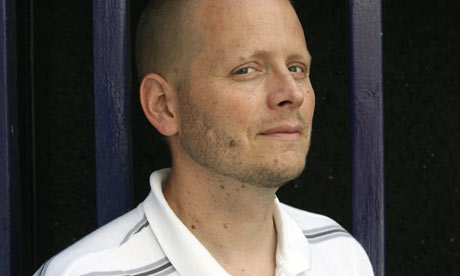
Patrick Ness, Booktrust's first-ever writer-in-residence, is the winner of the Guardian children's book prize and the Booktrust teenage book award for The Knife of Never Letting Go, his first novel in the Chaos Walking series. It burst on to the young adult's book scene in 2008 with its tale of a dystopian world in which women are banished and men can hear each other's thoughts (the "Noise"). The book's hero, Todd, accompanied by his chatty dog, Manchee, and new friend, Viola, must flee the town where he grew up and discover the secrets behind its facade. The second book in the series, The Ask and the Answer, which came out in May, gets even darker, as Todd and Viola find themselves on opposite sides of a brutal and terrifying power struggle in the town in which they thought they had found a haven.
Ness has written a spin-off Chaos Walking short story that explains how Viola crash-lands on the planet in The Knife of Never Letting Go. We've got the first 400 words – read the rest on the Booktrust site on Monday.
The New World: a story of Chaos Walking
Hope. That's all anyone ever talked about on the convoy, especially as we got closer. Hope, hope, hope.
As in, "I hope the weather's good." This from people who'd never actually experienced weather except in immersive vids.
Or, "I hope there's interesting wildlife." From people who'd only ever met Scampus and Bumpus, the ship's cats on the Delta. 10,000 frozen sheep and cow embryos didn't count.
Or, "I hope the natives are friendly." This always said with a laugh because there aren't supposed to be any natives, at least according to the deep space probes.
Everybody was hoping for something, talking about our new life to come and all that they hoped from it. Fresh air, whatever that's supposed to mean. Real gravity, instead of the fake kind that broke every now and then (even though no one over 15 would admit that it was actually really fun when it did). All the wide open spaces we'd have, all the new people we'd meet when we woke them up, ignoring completely what happened to the original settlers, super-confident that we were so much better equipped that nothing bad could possibly happen to us.
All this hope, and here I was, right at the very edge of it, looking out into the darkness, the first to see it coming, the first to greet it when we found out what it really looked like.
But what if?
"Is it because hope is scary?" my father asked.
I looked back at him, startled. "You think so, too?"
He smiled, full of love. "Hope is terrifying, Viola," he said. "No one wants to admit it, but it is."
I feel my eyes go wet again. "Then how can you stand it? How can you bear even thinking it? It feels so dangerous, like you'll be punished for even thinking you deserved it."
He touched my arm, just lightly. "Because, Viola, life is so much more terrifying without it."
I swallowed away my tears again. "So you're telling me the only choice I have is which way I'm going to be terrified for the rest of my life?"
He laughed and opened his arms. "And at last a smile," he said.
And he did hug me.
And I let him.
But in my chest, there was still fear, and I didn't know which kind it was. Fear with hope, or fear without it.

